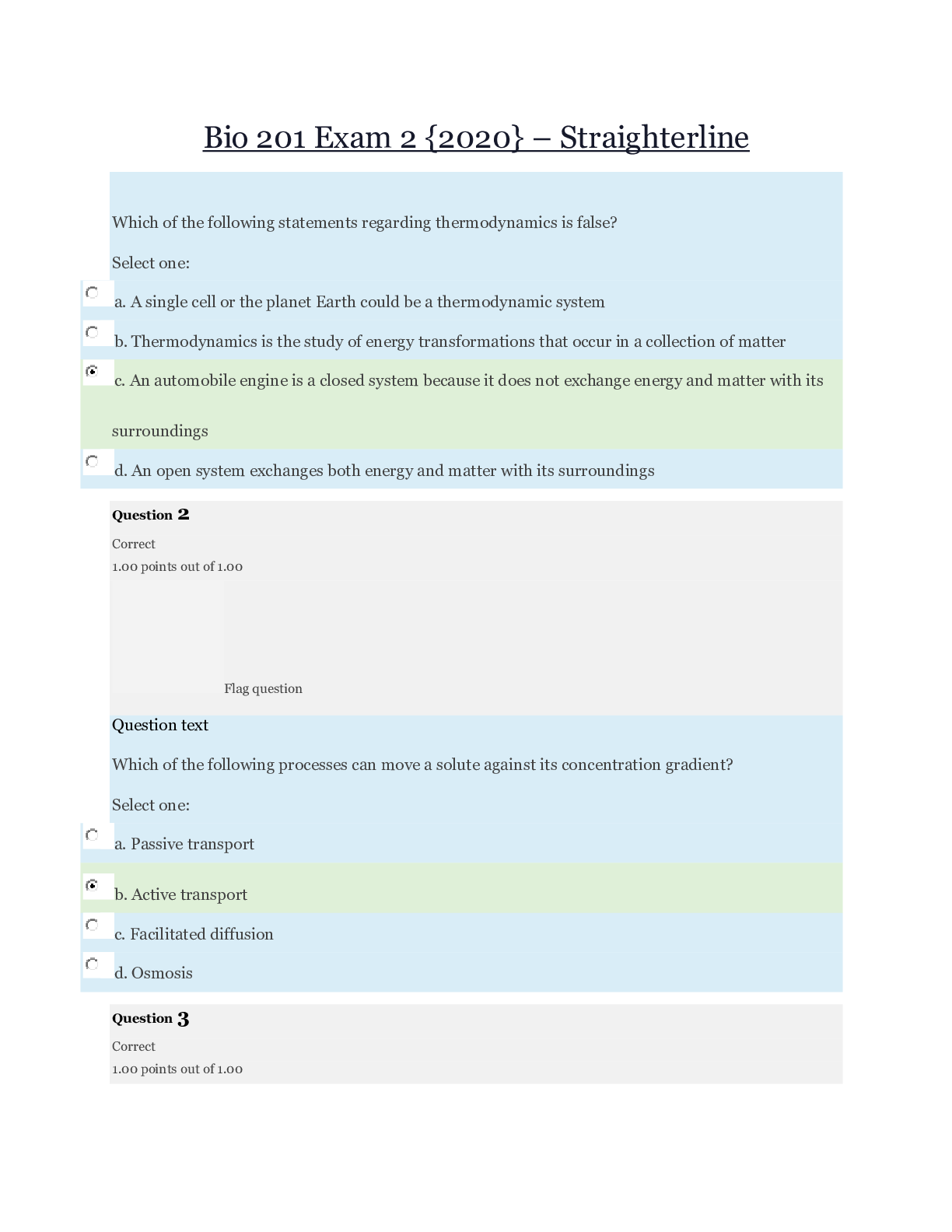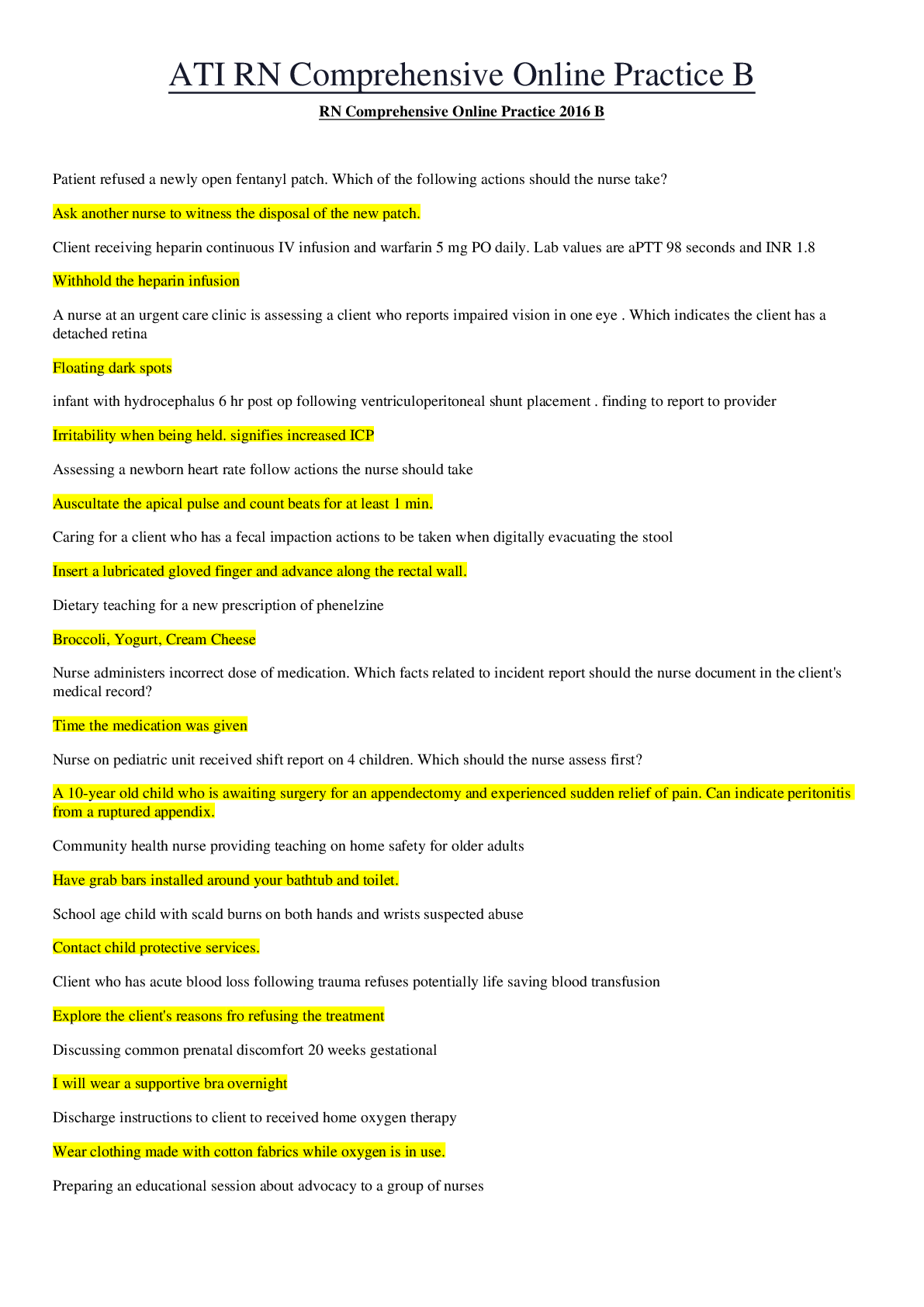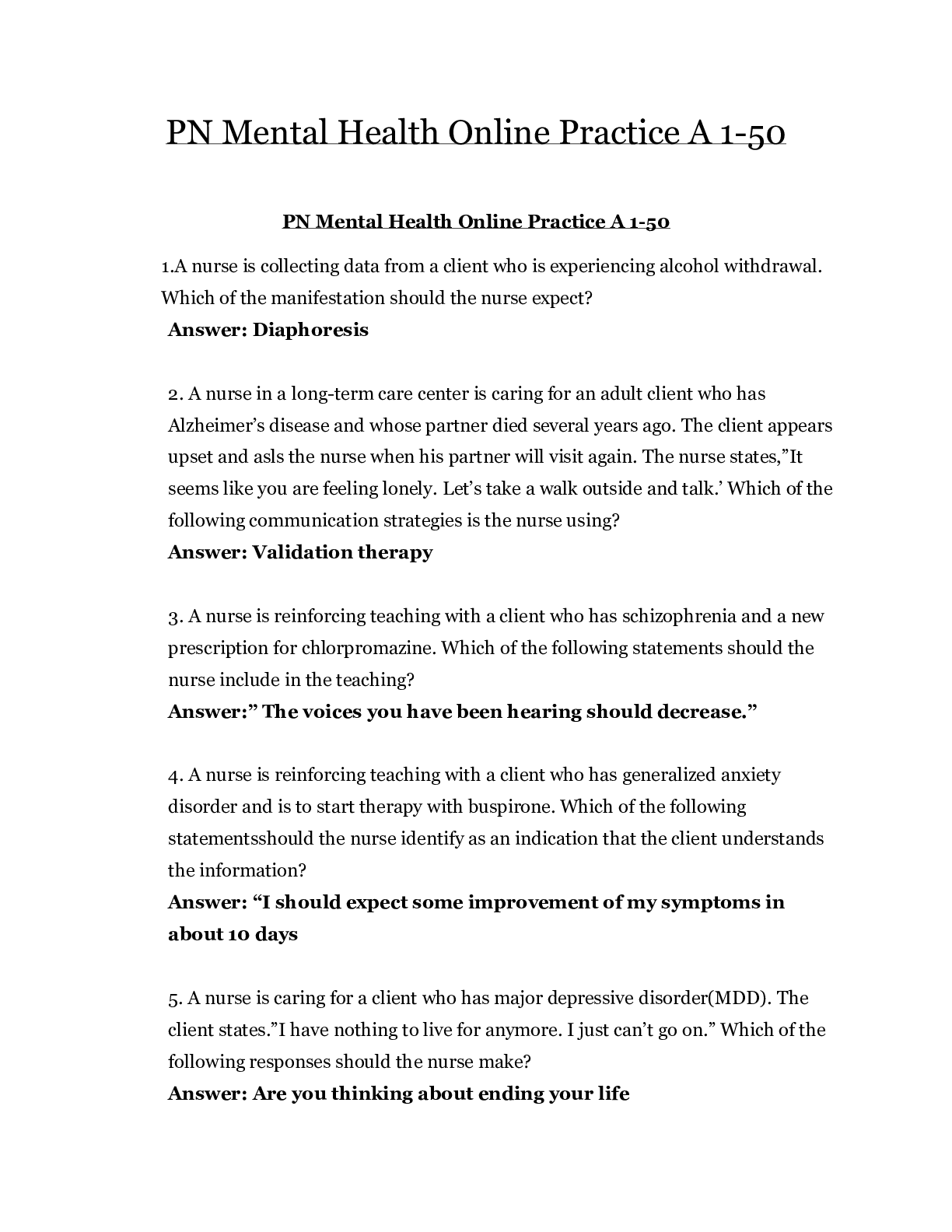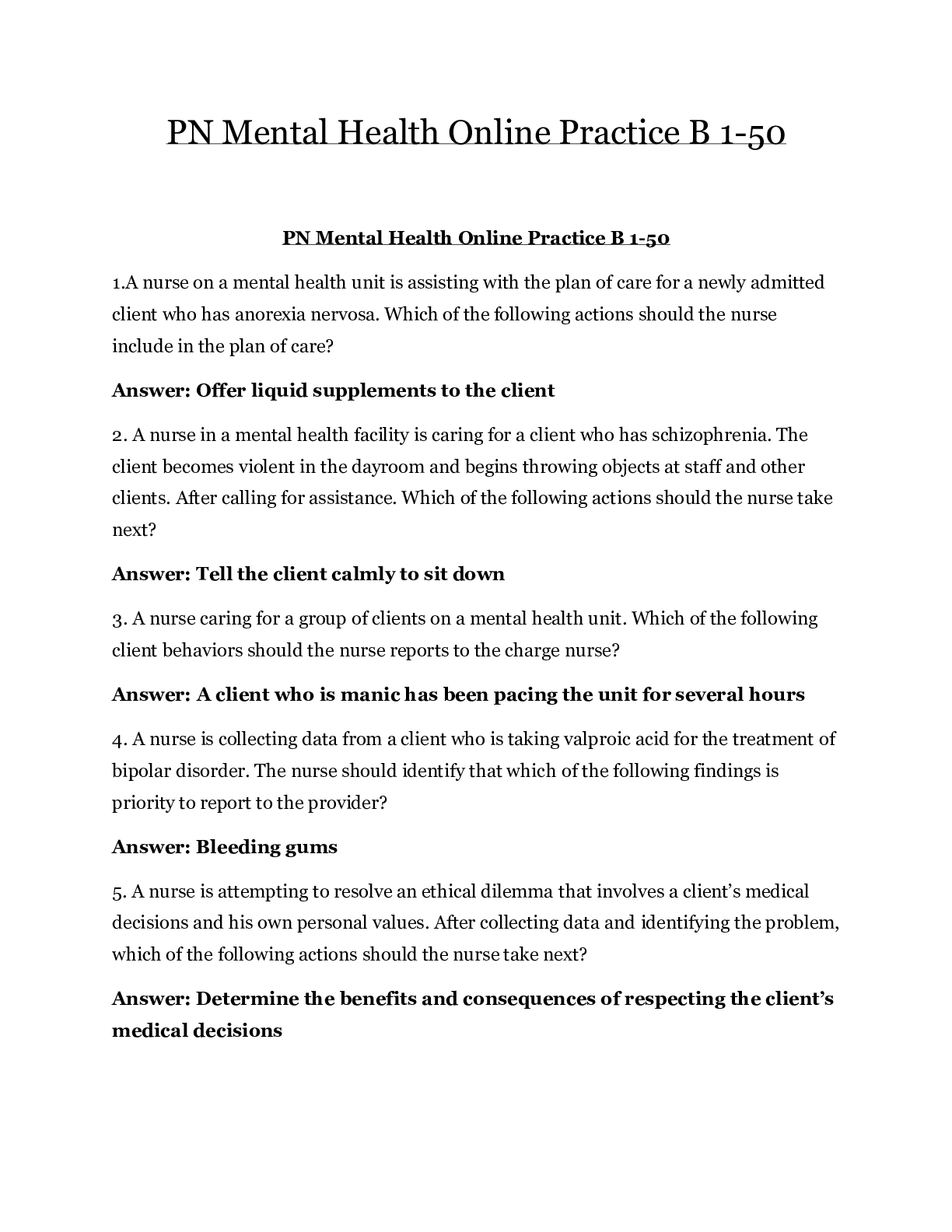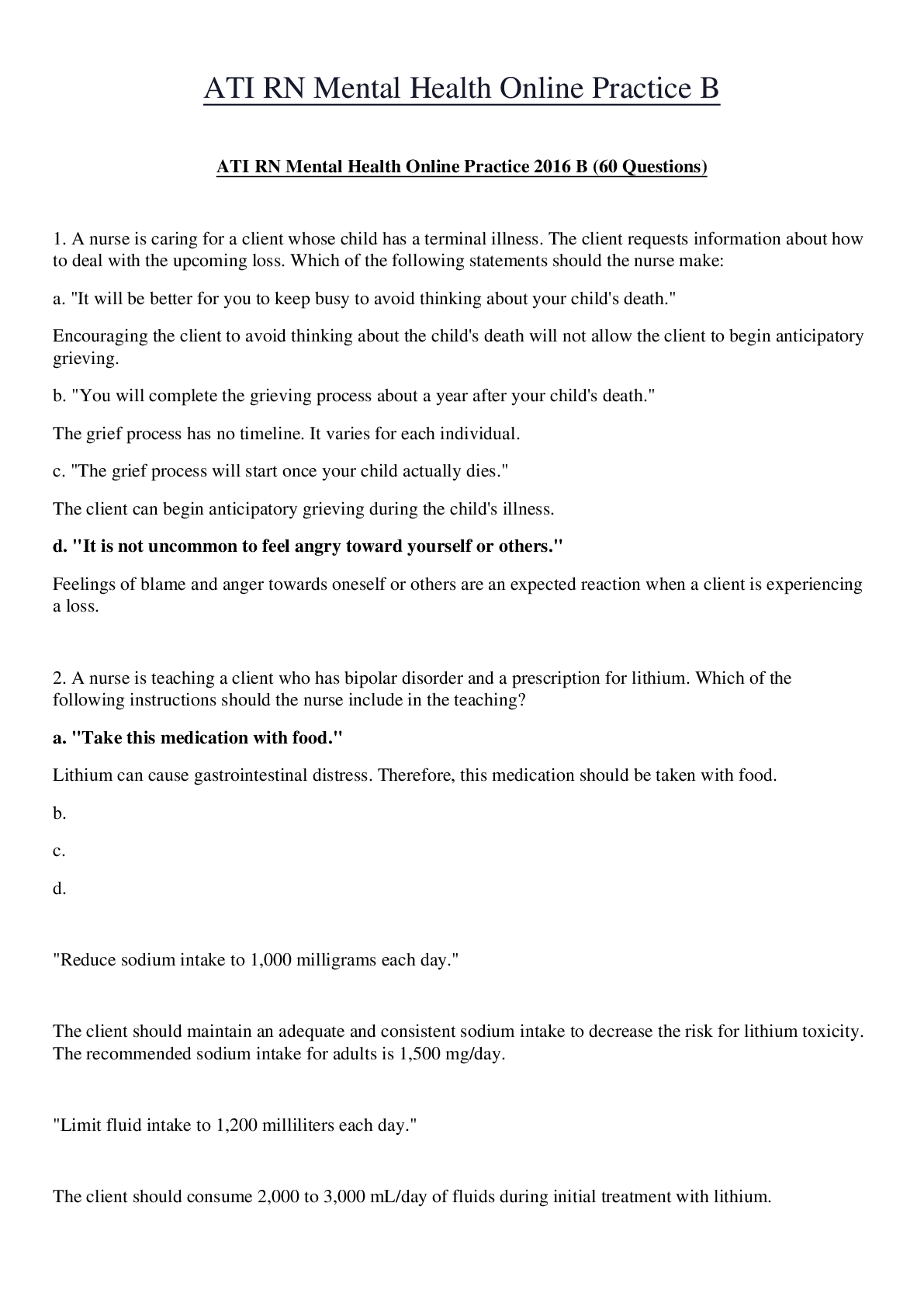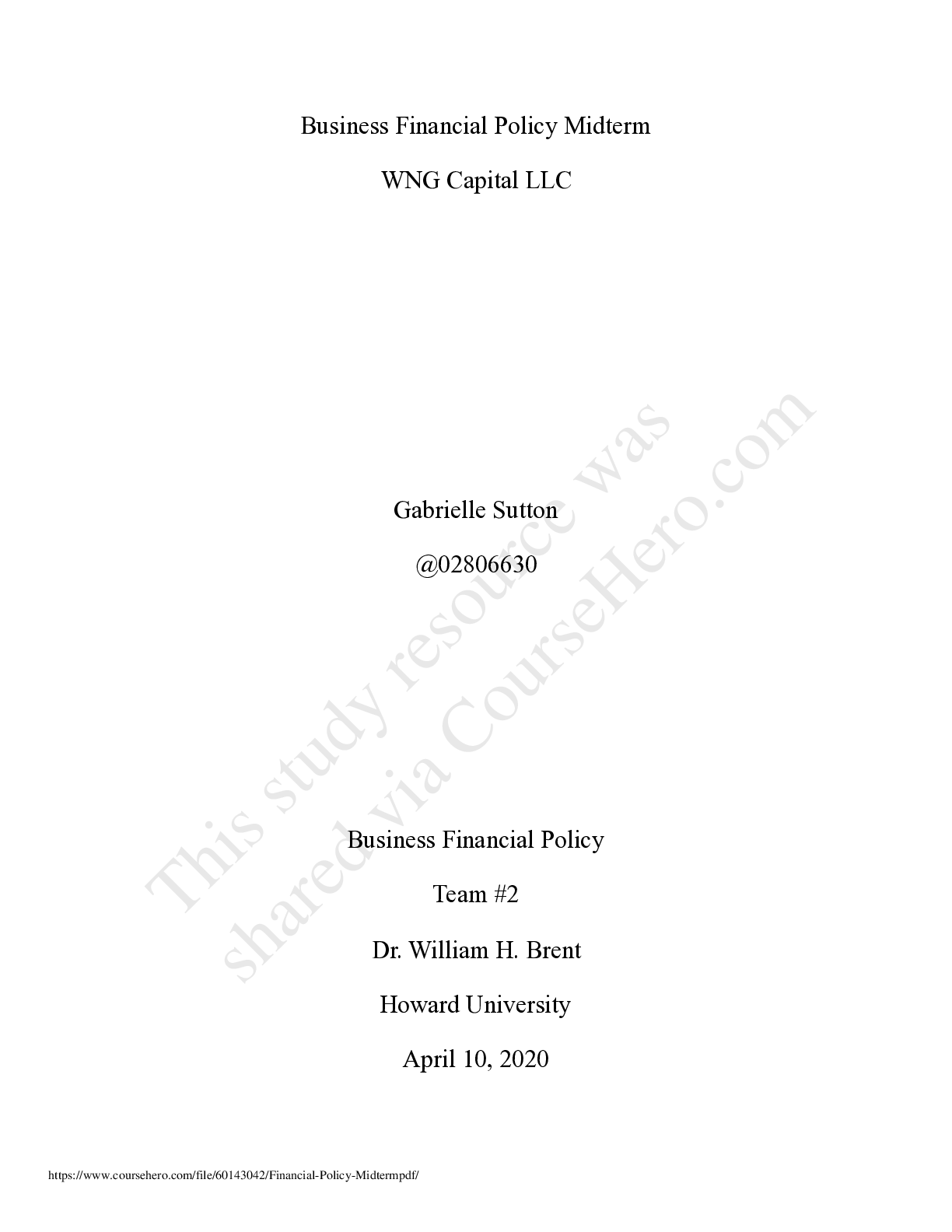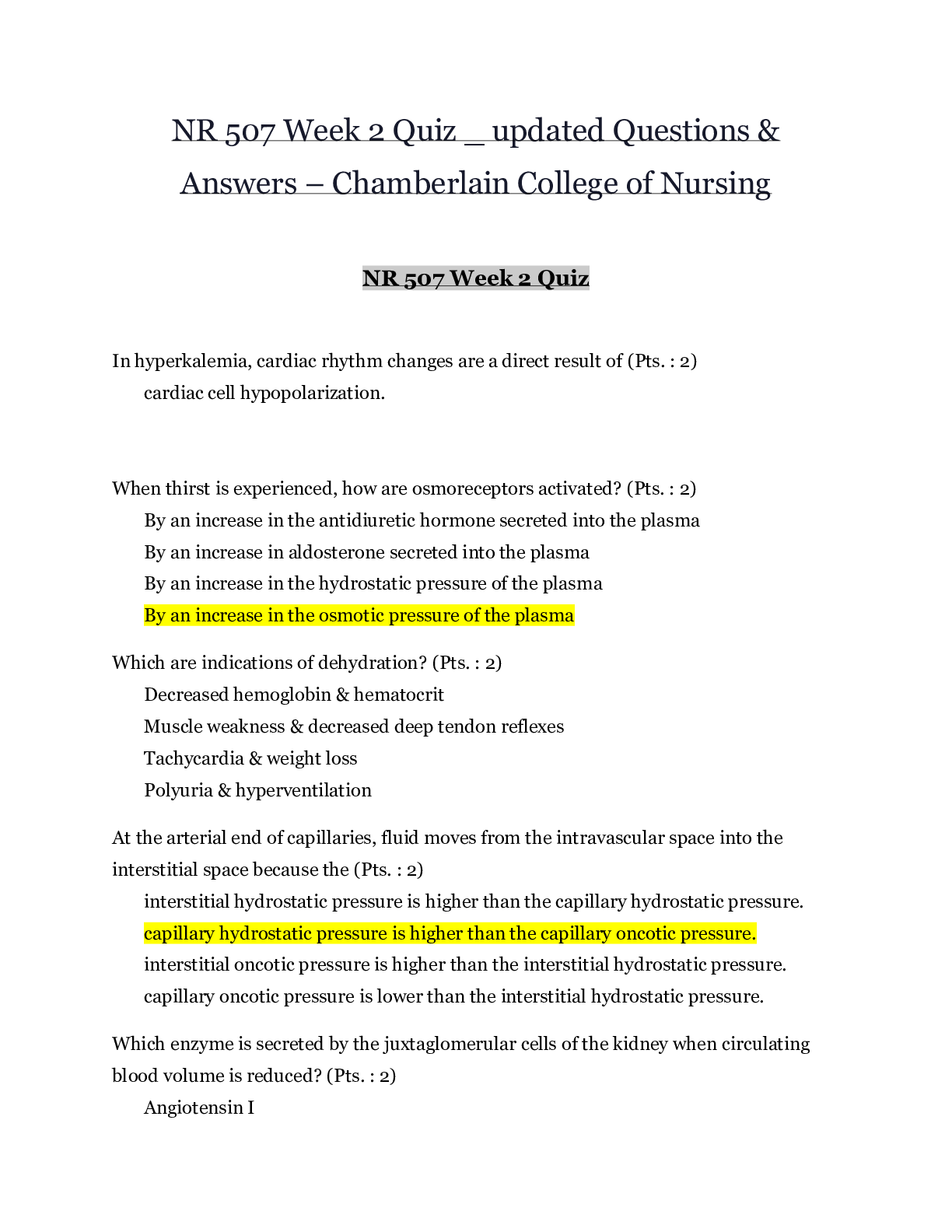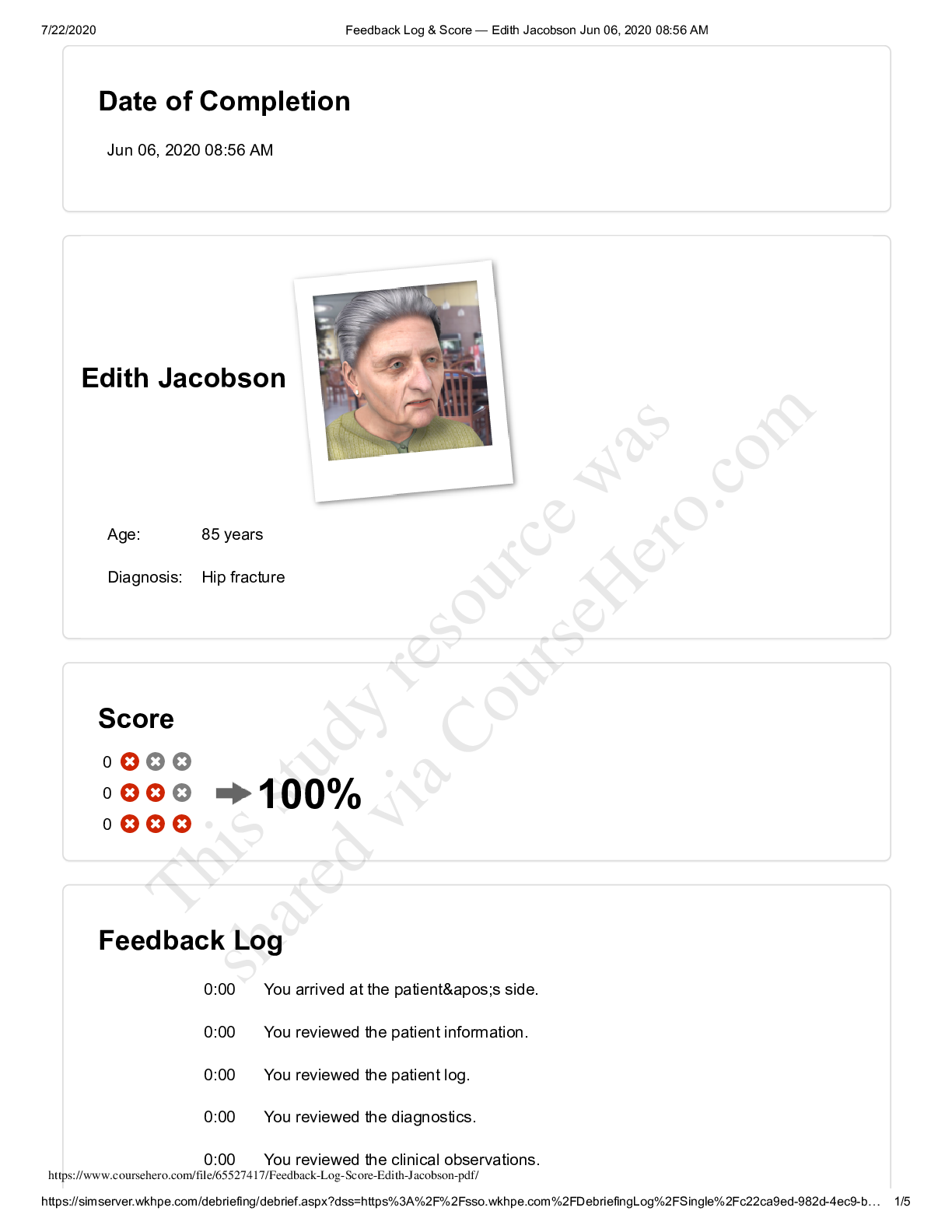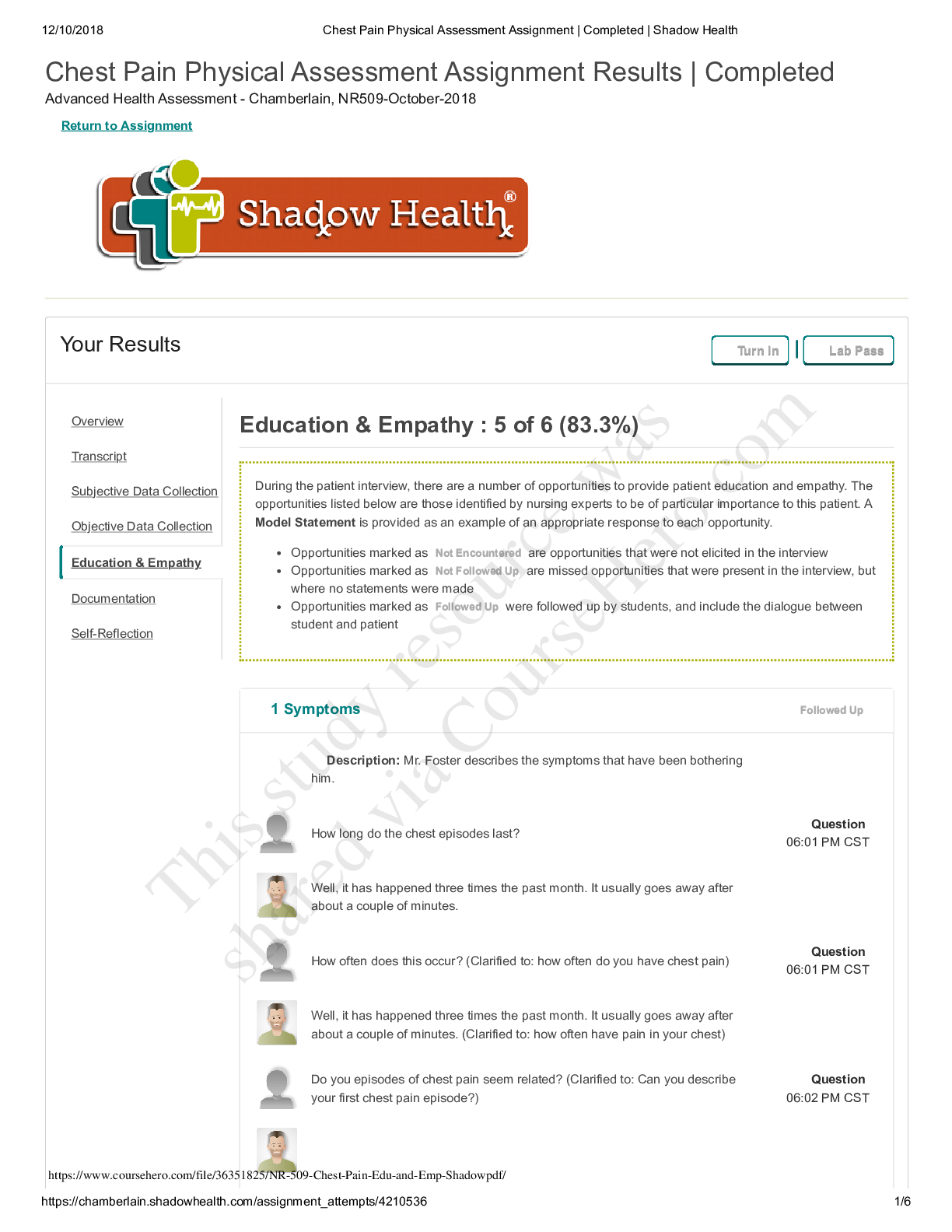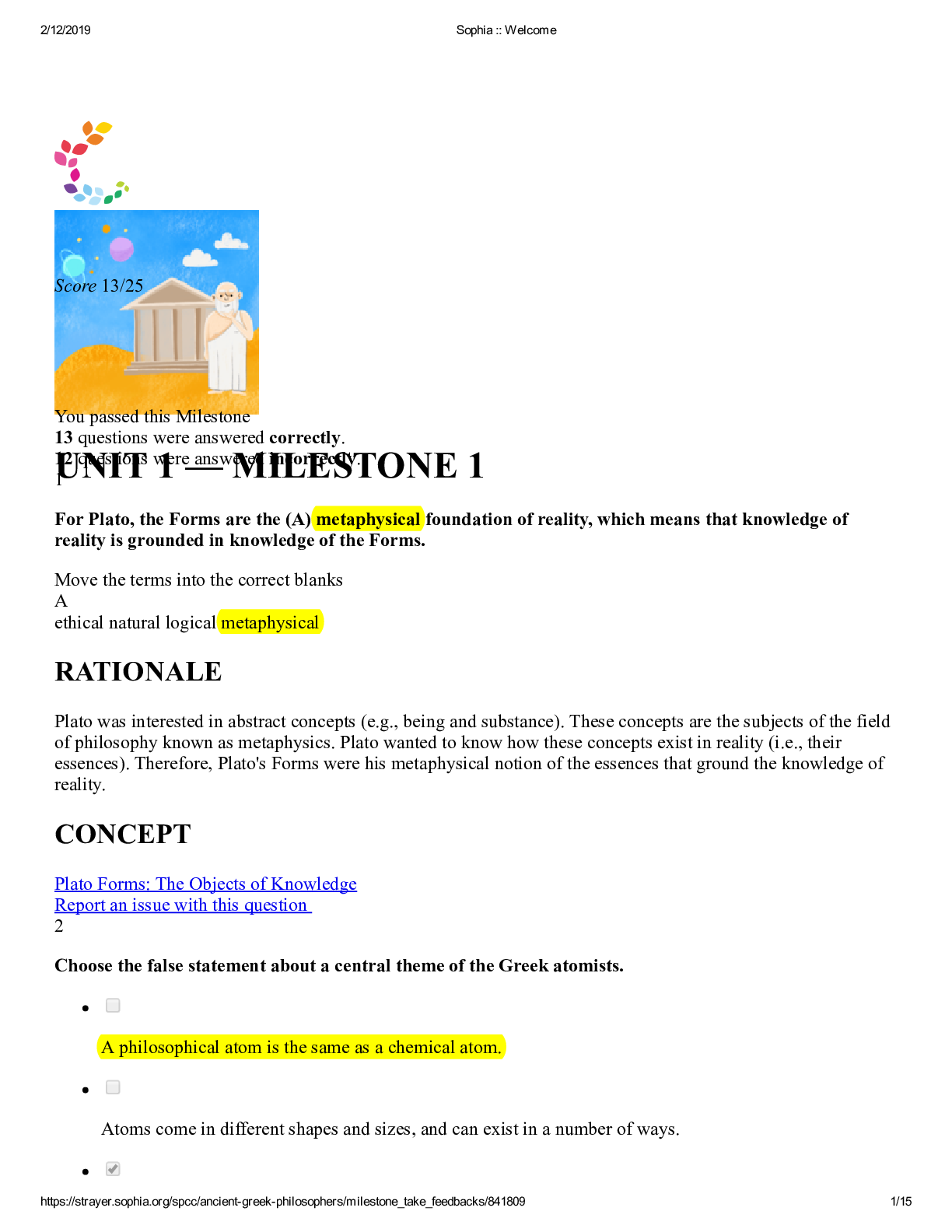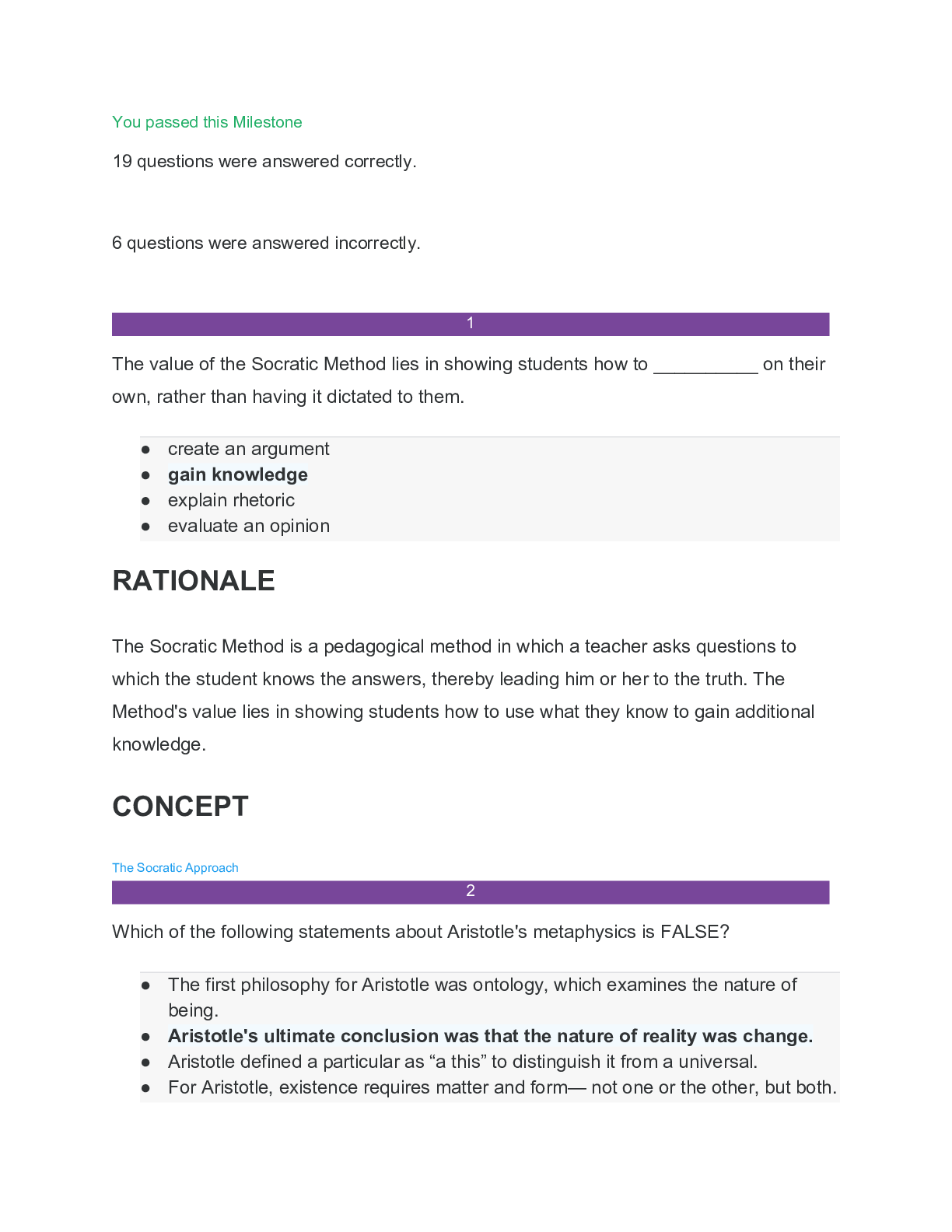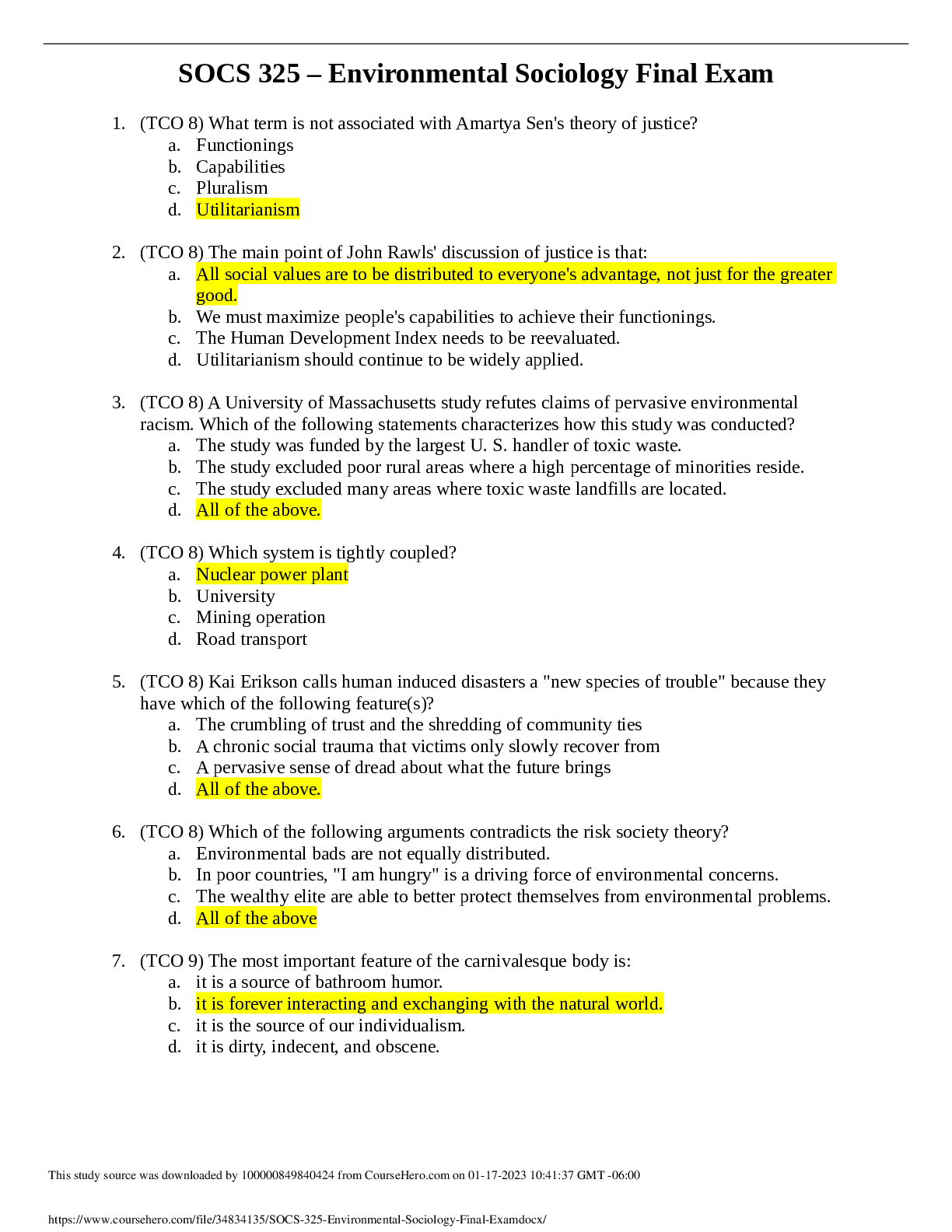Philosophy > EXAM > Ancient_Greek_Philosophers_Milestone_1_Exam 2020 (A GRADE) - DeVry University | Ancient_Greek_Philos (All)
Ancient_Greek_Philosophers_Milestone_1_Exam 2020 (A GRADE) - DeVry University | Ancient_Greek_Philosophers_Milestone_1_Exam 2020 (A GRADE)
Document Content and Description Below
Ancient_Greek_Philosophers_Milestone_1_Exam 2020 (A GRADE) - DeVry University UNIT 1 MILESTONE 1 You passed this Milestone 1 When Crito tries to convince Socrates that he must not betray his... own life, how does Socrates respond? • He says that life would not be worth living if the principle of justice was violated. • He says that all life has value, but society determines the fate of man. • He says that what is right is often misunderstood by mortals and must be left to the gods. • He says that he is not afraid of dying and knows that his followers will restore his good name. RATIONALE In the Crito, Socrates' friend (Crito) tried to convince him to escape and avoid execution. Socrates refused to do so, and explained why escape would be wrong. Socrates asserted that not all life has intrinsic value; only the good life does. Since he believed that he would violate the principle of justice (established by the Social Contract) by avoiding death, Socrates refused to avoid it. CONCEPT The Crito: The Duties of the Social Contract 2 A Stoic avoids looking for good in external things and recognizes that value __________. • has little to do with ethics • is determined by intrinsic personality traits • can be found in every living entity • lies in our judgment of the world RATIONALE Stoicism is a philosophical approach that encourages people to focus only on what they can control (e.g., their desires, emotions, reactions, and judgments of the world). They should not be concerned by things that are beyond their control. Stoicism directs people to focus on their internal values rather than external rewards. CONCEPT Stoicism: The Ethics of Dispassion 3 Choose the example that best demonstrates a central tenet of Stoicism. • Bob is such a rabid Cubs fan that it isn’t fun to watch a baseball game with him. • Stephanie is a good nurse because she is skillful and always remains composed. • Carlene is devastated when her outdoor party is interrupted by a thunderstorm. • Mr. Donovan insists that he begin each morning with pastry and a cup of sweet tea. RATIONALE Stoicism is a philosophy that encourages people to focus only on what they can control (e.g., their desires, emotions, and reactions). Because Stoicism focuses on eliminating desires, and emphasizes control of emotions, it leads people to perform their assigned jobs (or roles) skillfully and dispassionately. CONCEPT Stoicism: The Ethics of Dispassion 4 Which branch of philosophy examines the ultimate nature of reality? • Natural philosophy • Epistemology • Cosmology • Metaphysics RATIONALE Metaphysics is the branch of philosophy that is concerned with discovering and describing the ultimate nature of reality. Cosmology is the study of the universe in its totality, natural philosophy examines nature and the universe, and epistemology analyzes and defends concepts of knowledge. CONCEPT What is Philosophy? 5 Being a good parent is a __________ condition for having a child. Apply conceptual analysis to this statement and choose the answer that correctly describes the relationship. • neither necessary nor sufficient • necessary, not sufficient • sufficient, not necessary • both necessary and sufficient RATIONALE Being a good parent is not a necessary condition, or logical requirement, for having a child because there are people who have children who aren't good parents. In order to be a parent, a person must have a child. That makes being a good parent a sufficient, but not a necessary condition for having a child. CONCEPT Plato: An academic approach to concepts 6 Read the following statement by Socrates: “In questions of just and unjust, fair and foul, good and evil, which are the subjects of our present consultation, ought we to follow the opinion of the many and to fear them; or the opinion of the one man who has understanding?” Extract Socrates' argument from this text and choose the sentence that accurately reflects it. • Absolute justice can only be achieved when the state agrees with the opinion of the masses. • He who has experienced the administration of justice will do as the majority commands him to do. • Any man who cares about ethics and wisdom has an obligation to listen to himself over others. • Non-experts have opinions, but the man who is an expert in a field has true knowledge. RATIONALE In this selection from the Crito, Socrates argues that we should consult experts (who have "understanding," or knowledge) when we seek wisdom, and not the majority (who have only opinion). CONCEPT The Apology — Socrates' Arguments 7 Which of the following statements about the atomistic worldview is FALSE? • Philosophical atoms of different shapes and consistencies are the fundamental components of reality. • Everything in the universe exists as a single atom, or a collection of atoms. • The worldview of philosophical atomists, with some revisions, has been adopted by contemporary science. • The philosophical worldview of the early Greek atomists had great influence on philosophical, scientific, and religious thinking, but only for a brief period of time. RATIONALE The philosophical worldview of the early Greek atomists has continued to have an impact throughout history. Atomism has been adopted and modified by contemporary science, and has had a lasting influence on religion and theology. CONCEPT The Atomistic Worldview 8 Recall the similarities and differences between Plato and Aristotle's philosophical approaches. Select the statement that would most likely have been made by Plato, rather than by Aristotle. • “My ideas have served as a starting point for both philosophy and the physical sciences.” • “I teach by example and I live by what I teach, no matter the consequences.” • “In order to find truth, we must first identify what makes a thing what it is, its essence. • “My approach is scientific and empirical; we learn about truth from observation and discovery.” RATIONALE Plato proposed the existence of essences in his doctrine of the Forms. As a result, it is more likely that he would have made this statement. As a rationalist philosopher, Plato believed that knowledge does not rely on human senses alone, and can be accessed through the existence of essences. The statements which involve science and empiricism are reflective of Aristotle's views. The statement about teaching and living by example is reflective of Socrates' philosophy. CONCEPT Aristotle: The Dissection of Reality 9 In the Apology, what does Socrates do when he is found guilty and sentenced to death? • He tries to convince the jury to accept his defense. • He agrees that his actions were immoral and that the decision of the judges is just. • He is willing to face death rather than violate the principles of his moral philosophy. • He asks Plato to record his life. RATIONALE The Apology is Plato's transcription of the defense Socrates presented at his trial on charges of "denying the gods" and "corrupting the youth of Athens." When found guilty and sentenced to death, Socrates accepts his sentence. He argues that it is more important to live rightly, which he believes he has done, than to avoid death by compromising one's moral philosophy. CONCEPT The Apology: A Defense of Philosophy 10 Select the statement upon which Plato and Aristotle would disagree. • Truth is important above all else. • Reasoning and logic are key to finding truth. • Essences exist and are genuine entities. • Essences exist independently of the world. RATIONALE Plato and Aristotle agree on all of these points except for the statement that essences exist independently of the world. This was Plato's belief, but Aristotle believed that essences exist only within worldly objects, and nowhere else. CONCEPT Plato vs. Aristotle: The Mathematician or the Biologist 11 All teachers are robots. Cynthia is a teacher. Therefore, Cynthia is a robot. Evaluate the argument and select the option that describes it. • Deductive, valid, unsound • Inductive, strong, cogent • Inductive, weak, uncogent • Deductive, invalid, sound RATIONALE Because the inferential claim in this example is one of logical certainty, and is about definition and form rather than cause and effect, this is a deductive argument. Since a case in which the premises are true and the conclusion is false cannot exist, this argument is valid. However, this argument is unsound because the first premise is false: Not all teachers are robots. CONCEPT Evaluating an Argument in Action 12 Roland is a compassionate person. He sometimes gives money that he needs for himself to strangers who beg on the street. According to Aristotle’s ethics, Roland should do which of the following in order to cultivate the virtue of compassion? • Find middle ground between being too compassionate and not compassionate enough. • Spend time with compassionate people in order to learn the essence of compassion. • Find other ways to help people besides giving his money away. • Stop giving away his money so that he can focus on taking care of himself. RATIONALE Aristotle's Doctrine of the Mean states that virtue must be cultivated as a rational mean between extremes. Therefore, Roland should find middle ground between being too compassionate and not compassionate enough in order to cultivate the virtue of compassion. CONCEPT Aristotle's Highest Good 13 For Plato and his Doctrine of Forms, a person can determine whether an act is courageous if he or she can __________. • accurately describe the Form of Courage • explain what courage means in the real world • clearly understand the value of courage • imagine an unambiguously courageous action RATIONALE According to Plato, the Forms are the basis of our knowledge of reality. All worldly objects participate in (i.e., imitate) their corresponding Form that exists in Platonic Heaven. We can determine whether an act is courageous if we know, and can describe, the Form of Courage. CONCEPT Applying Plato's Metaphysics 14 Choose the statement that describes a central theme of Parmenidean metaphysics. • Mortal and divine knowledge can be joined. • The opinions of mortals are universally reliable. • The world is composed of linked opposites. • The universe consists of one, unchanging entity. RATIONALE Parmenidean metaphysics includes the concept of "substance monism" — the belief that all reality is one object. This object is called the “what-is.” The "what-is" is eternal and unchanging. None of the other statements represent Parmenidean metaphysics. CONCEPT Parmenides and the Doctrine of Permanence 15 Which of the following statements about Aristotle’s metaphysics is FALSE? • In order for a statement to be true, one must state that an object exists, what the object is, and the state in which it exists. • The distinction between form and matter is purely conceptual— one does not, and cannot, exist without the other. • Examining the nature of being, and knowing what kinds of things exist, is a sensible beginning point for philosophical inquiry. • Humans have the natural capacity to know many things without divine revelation or empirical evidence. RATIONALE Aristotle would agree with all of these statements except the suggestion that we can have knowledge without empirical evidence. To Aristotle, all knowledge is grounded in human experience and flows from empirical evidence. CONCEPT Aristotle on What There Is 16 Socrates differed from the pre-Socratics in that his interests were primarily in __________. • ethics and epistemology • how the universe works • the true nature of reality • cosmology and natural philosophy RATIONALE The focus of Socrates' philosophy was different from that of the Pre-Socratic philosophers. He investigated questions involving ethics and epistemology. The Pre-Socratic philosophers had focused on natural philosophy and cosmology. CONCEPT Socrates: The Father of Western Philosophy 17 When Socrates is asked about suicide in the Phaedo, he replies that __________. • our bodies belong to the gods • the body is eternal and cannot die • it is man’s choice to live or to die • philosophers must always be prepared for death RATIONALE In the Phaedo, Socrates contends that suicide is immoral. He argues that the bodies of men belong to the gods, and that only the gods can choose to end a life. CONCEPT The Phaedo: The Death of Socrates 18 “It is my belief that everything in the cosmos is made of water.” Which ancient philosopher would most likely have made this statement? • Thales • Protagoras • Empedocles • Pythagoras RATIONALE Thales was the Pre-Socratic philosopher who believed that everything in the cosmos was made of water. Thales and his pupils, Anaximander and Anaximenes, sought to discover the nature of the cosmos. CONCEPT Cosmology and the First Philosophers 19 According to Aristotle’s ethics, virtues should be pursued by __________. • thinking abstractly • defining what is true • finding a rational mean between two extremes • determining the purest form of action RATIONALE Aristotle's Doctrine of the Mean states that virtue must be cultivated as a rational mean between extremes. For example, the virtue of courage is found between the vices of cowardice and foolhardiness. CONCEPT Aristotle's Highest Good 20 Heraclitus' Logos is part of his __________. • ethics • mathematics • metaphysics • science RATIONALE Heraclitus asserted that true reality is the Logos, a Greek word that can be translated as “account.” Since metaphysics is the branch of philosophy concerned with discovering and describing the ultimate nature of reality, the Logos is part of Heraclitus' metaphysics. CONCEPT Heraclitus and the Doctrine of Impermanence 21 The value of the Socratic Method lies in showing students how to __________ on their own, rather than having it dictated to them. • evaluate an opinion • gain knowledge • explain rhetoric • create an argument RATIONALE The Socratic Method is a pedagogical method in which a teacher asks questions to which the student knows the answers, thereby leading him or her to the truth. The Method's value lies in showing students how to use what they know to gain additional knowledge. CONCEPT The Socratic Approach 22 In Plato's view, justified true beliefs must be related to his metaphysical notion of __________, which he called the Forms. • knowledge • essence • wisdom • truth RATIONALE Plato's Forms are also referred to as "essences." An essence is that which makes an object what it truly is. Essences provide the basis for knowledge (i.e., justified true belief). For example, we can know what "goodness" truly is because a real thing that is the essence of goodness, called the Form of Goodness, exists. CONCEPT Plato's Forms: The Objects of Knowledge 23 Which of the following statements about the metaphysical tenets of Plato’s Doctrine of the Forms is FALSE? • The intellectual realm in which the Forms exist is unchanging and eternal. • Worldly objects imitate the more real, genuine Forms of objects. • There is no knowledge because everything is in a state of transition and nothing is true. • Plato’s Doctrine of the Forms grounds knowledge and being. RATIONALE The statement that "There is no knowledge because everything is in a state of transition and nothing is true" is the opposite of Plato's metaphysical beliefs. His Doctrine of the Forms argues that all worldly objects are related to their essences (i.e., Forms), which are real, unchanging, perfect entities that exist in an intellectual realm called Platonic Heaven. The Forms provide the basis for all knowledge. CONCEPT Plato Forms: The Foundations of Being 24 Which of the following is NOT an example of Aristotle’s notion of hylomorphism? • The soul and a human being • An unborn child and a human being • A statue and a human being • Bodily organs and a human being RATIONALE Aristotle's notion of hylomorphism states that being is a relationship, a union of form and matter. All of the examples that signify relationships are cases of hylomorphism: bodily organs (matter) and human beings (form); an unborn child (matter) and a human being (form); human beings (matter) and the soul (form). There is no ontological relationship between a statue and a human being, so this is not an example of hylomorphism. CONCEPT Aristotle on What There Is 25 Kendra believes that women have a right to choose to have an abortion. Select the statement that is consistent with Kendra's belief. • “I voted for this presidential candidate because she supports a woman's right to have an abortion.” • “Some women use abortion as a form of birth control, which is wrong.” • “Every woman should be a mother; it is our function and purpose as human beings.” • "The man should have an equal say in whether or not a woman ends her pregnancy.” RATIONALE To live philosophically, a person must examine his or her beliefs to ground them in knowledge, and then act according to those beliefs. By voting for a presidential candidate who supports a woman's right to have an abortion, Kendra displays a consistent philosophical worldview. CONCEPT Philosophical Analysis as a Way of Life [Show More]
Last updated: 1 year ago
Preview 1 out of 14 pages
Instant download
 - DeVry University.png)
Buy this document to get the full access instantly
Instant Download Access after purchase
Add to cartInstant download
Reviews( 0 )
Document information
Connected school, study & course
About the document
Uploaded On
Sep 06, 2020
Number of pages
14
Written in
Additional information
This document has been written for:
Uploaded
Sep 06, 2020
Downloads
0
Views
55

